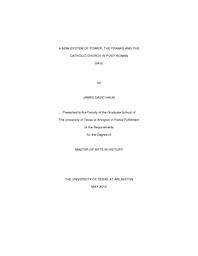
ATTENTION: The works hosted here are being migrated to a new repository that will consolidate resources, improve discoverability, and better show UTA's research impact on the global community. We will update authors as the migration progresses. Please see MavMatrix for more information.
Show simple item record
| dc.contributor.author | Haun, James David | en_US |
| dc.date.accessioned | 2014-03-10T21:03:36Z | |
| dc.date.available | 2014-03-10T21:03:36Z | |
| dc.date.issued | 2014-03-10 | |
| dc.date.submitted | January 2013 | en_US |
| dc.identifier.other | DISS-12142 | en_US |
| dc.identifier.uri | http://hdl.handle.net/10106/24016 | |
| dc.description.abstract | The Franks developed a new system of power in post-Roman Gaul with the help of the Catholic Church. From the sixth through the ninth century three Frankish kings played crucial roles in the development of this new system, and in the process of implementing their shared system of governance, they established the necessary conditions for the Church to make the arguments of the Investiture Controversy centuries before the actual conflict. The Investiture Controversy has been discussed and analyzed at great length by an enormous number of scholars over the decades and most argue that the proximate cause of this dispute is the friction between the Holy Roman Emperor, Henry IV, and the reformist pope, Gregory VII in the eleventh century. This thesis argues that the foundations for the arguments used in the eleventh century were laid in sixth through ninth century post-Roman Gaul and these foundational elements made the Investiture Controversy inevitable. | en_US |
| dc.description.sponsorship | Reinhardt, Steven G. | en_US |
| dc.language.iso | en | en_US |
| dc.publisher | History | en_US |
| dc.title | A New System Of Power: The Franks And The Catholic Church in post-Roman Gaul | en_US |
| dc.type | M.A. | en_US |
| dc.contributor.committeeChair | Reinhardt, Steven G. | en_US |
| dc.degree.department | History | en_US |
| dc.degree.discipline | History | en_US |
| dc.degree.grantor | University of Texas at Arlington | en_US |
| dc.degree.level | masters | en_US |
| dc.degree.name | M.A. | en_US |
Files in this item
- Name:
- Haun_uta_2502M_12142.pdf
- Size:
- 655.9Kb
- Format:
- PDF
This item appears in the following Collection(s)
Show simple item record


